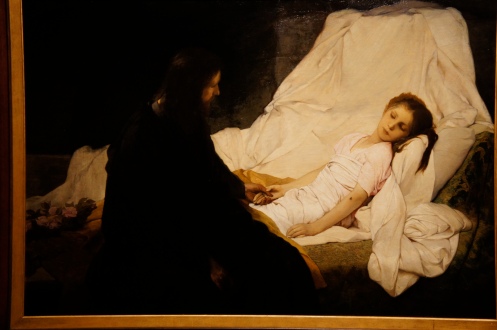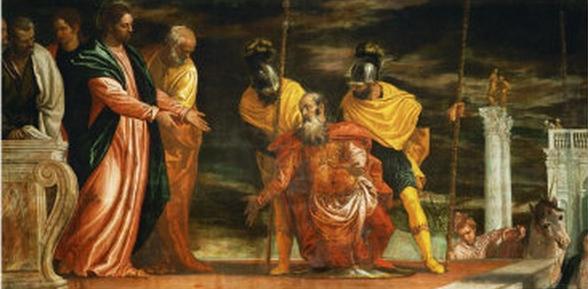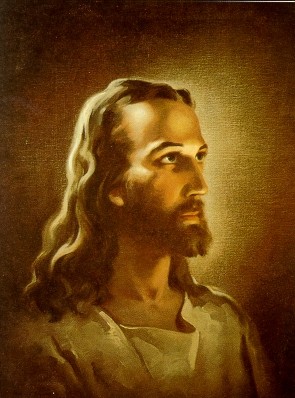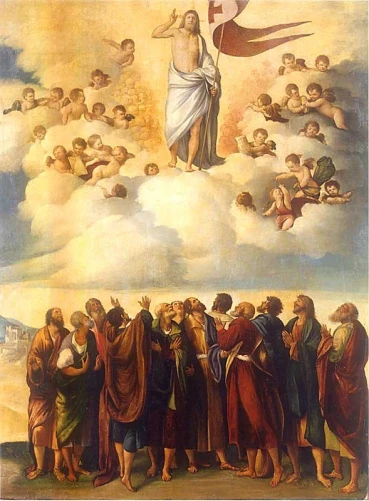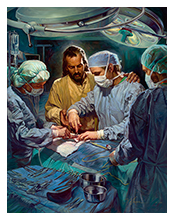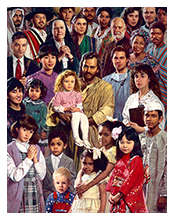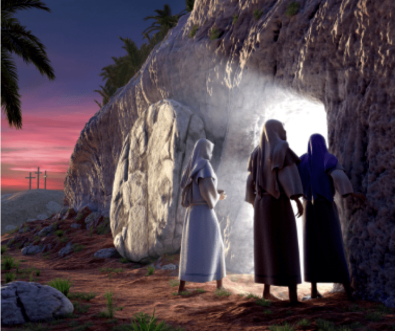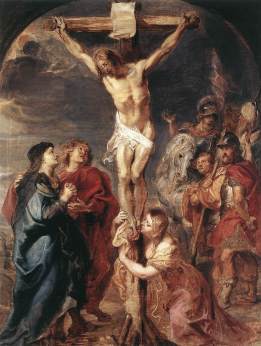Why do so many people consider a pedicure to be necessary?
John 13:1-17 It was just before the Passover Festival. Jesus knew that the hour had come for him to leave this world and go to the Father. Having loved his own who were in the world, he loved them to the end. 2 The evening meal was in progress, and the devil had already prompted Judas, the son of Simon Iscariot, to betray Jesus. 3 Jesus knew that the Father had put all things under his power, and that he had come from God and was returning to God; 4 so he got up from the meal, took off his outer clothing, and wrapped a towel around his waist. 5 After that, he poured water into a basin and began to wash his disciples’ feet, drying them with the towel that was wrapped around him.
6 He came to Simon Peter, who said to him, “Lord, are you going to wash my feet?”
7 Jesus replied, “You do not realize now what I am doing, but later you will understand.”
8 “No,” said Peter, “you shall never wash my feet.” Jesus answered, “Unless I wash you, you have no part with me.”
9 “Then, Lord,” Simon Peter replied, “not just my feet but my hands and my head as well!”
10 Jesus answered, “Those who have had a bath need only to wash their feet; their whole body is clean. And you are clean, though not every one of you.” 11 For he knew who was going to betray him, and that was why he said not everyone was clean.
12 When he had finished washing their feet, he put on his clothes and returned to his place. “Do you understand what I have done for you?” he asked them. 13 “You call me ‘Teacher’ and ‘Lord,’ and rightly so, for that is what I am. 14 Now that I, your Lord and Teacher, have washed your feet, you also should wash one another’s feet. 15 I have set you an example that you should do as I have done for you. 16 Very truly I tell you, no servant is greater than his master, nor is a messenger greater than the one who sent him. 17 Now that you know these things, you will be blessed if you do them.
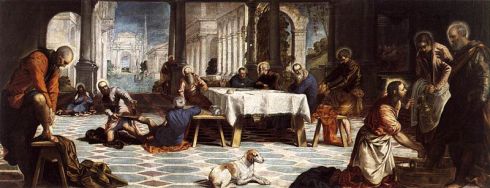
Christ Washing the Feet of His Disciples by Jacopo Tintoretto (1547)
This painting is from the wall of the 12th century church, San Marcuola in Venice. In the painting we also see the celebration of the Last Supper. The scene to the right of Jesus washing the feet of Peter and another disciple illustrates the example of humility and service to others. This work was acquired by King Charles I of England and later purchased by Luis de Haro, who gave it to King Felipe IV, who had it hung in the sacristy at El Escorial, where it remained until it entered the Prado Museum in 1936.
The fascinating part of this paining is that Jesus Christ, the Son of God, is washing the feet of his followers. What may be of even greater interest is that the other disciples in the background are also getting ready to have their feet washed. Their motivation had to be Jesus’ statement in verse 8 to Peter, “Unless I wash you, you have no part with me.” For Tintoretto and us, we know Jesus is not just washing feet but cleansing us of all our sins and imperfections of character. Jesus is also pictured as an ordinary person or as one who is also equal to us. A clear reference to Renaissance humanism or more specifically to the teaching of Martin Luther that Jesus Christ is both God and man.
Martin Luther preached in his Maundy Thursday sermon the importance of every Christian washing the feet of others!
“Again, we must understand by the term “feet-washing” a disposition which not only willingly serves others in a humble spirit, but which is also ready to forgive the failings of the brethren, as St. Paul says: “Bear ye one another’s burdens.”
We are often inclined to think: If only our neighbor had not this or that failing, we would gladly associate with him; but his many faults seem to us insufferable and repulsive. Let us bear in mind, whenever we observe such shortcomings in our husband, wife, child, servants, neighbors and others, that we have an excellent occasion for feet-washing. Let us do it then; that is, let us bear with mildness such infirmities, and seek to relieve others of them, always aware that this world is really a filthy cesspool, which we cannot pass without soiling our feet. This happens to me and to you, and to everyone. Should we therefore run away into deserts and solitudes, and associate with no one, as formerly the monks did? No, it is a Christian duty to wash the feet of others, we must stay where they are. We must be among the people who wade through unclean, filthy places. We must unbend our proud reserve, and though our feet should be clean and pretty, it behooves us to carry water, rags, soap and brush to cleanse and wash the feet of those who need such ablution.
To do this we must obey the word of the Apostle and “bear one another’s burdens”; we must right willingly assist the weak and needy, exercise patience and compassion, give them our hand for a support, and instruct and guide them to a purer and better life. If we are prudent, wise and learned, we ought therefore not to despise the simple and silly, but should so much the more exercise our skill to help them and to improve their condition. If we are pious, chaste and temperate let us not judge others harshly who have not such virtues, but let us strive to turn them from their evil way and lead them to do what is right. If we have not the faults which we notice in our brother, let us thank God that it is so; but at the same time we must not forget that we may have other failings which need patience and assistance from others. On the other hand, our neighbors have gifts with which they can help us in our infirmities; and even if they should be unable to help us even in the least, they are still our neighbors, whom we should treat with Christian love, as God has commanded us. Let harmony and friendship prevail among us as much as possible, and to this end let us exercise the spirit of humility.
What a pleasant, quiet, Christian life we could lead, if we would only be ready ever to wash each other’s feet! The one would assist and defend the other; we would all exercise patience and mildness and have no other aim but to make each other happy. Then might we be comforted by the assurance that we had, to some extent at least, complied with the command of Christ, and might appropriate the word of our Lord: “If ye know these things, happy are ye if ye do them.” But if we are derelict in the performance of our duty in this regard, we will feel a piercing sting in our hearts and be unhappy people, devoid of grace and joy.
From this we learn what this feet-washing means; it teaches a humble, friendly and Christ-like spirit, which Christians should, under all circumstances, manifest in their intercourse with each other. The Lord desires to direct our thoughts to the necessity of humility and condescension ; therefore He performed this ceremony of feet-washing shortly before His death. No matter what our ability may be, we dare not boast on account of our great endowments, but must reason thus: By giving us greater gifts than others, God meant that we should employ them in the service of others, and that we should cultivate so much the more a spirit of lowliness, and thrust the devil aside with his promptings to pride and arrogance.
The Lord, however, wishes to teach us, just here, another and more important lesson in regard to His person. When Peter refuses to be washed, Jesus answers him: “If I wash thee not, thou hast no part with Me.” In these words Christ refers not to the external washing of the feet, but to the washing from sin by His blood shed upon the cross, which washing still is efficacious among the believers in the Sacrament of Holy Baptism. Such washing is no example; for we can cleanse neither ourselves nor others from sin. The Son of God, the Lamb of God, who bore the sins of the world, can do it, and He alone. They who are washed of Christ confess that God in mercy, through His Son, pardoned and forgave their sins, and therefore they are ready to forgive the wrong which others may have done unto them, as Christ teaches in Matthew 18 and as we pray in the Lord’s Prayer: “Forgive us our trespasses as we forgive those who trespass against us.”
It is therefore evident that we should practice this feet-washing during our whole life. Amen.
Comments: hbitten@reverendluther.org

